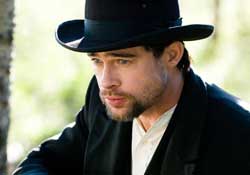 There are very few Westerns that I have been able to sit through, much less actually enjoy, and at two-plus hours I didn’t think I would really make it all the way through the latest adaptation of the life of outlaw Jesse James , “The Assassination of Jesse James By The Coward Robert Ford.”
There are very few Westerns that I have been able to sit through, much less actually enjoy, and at two-plus hours I didn’t think I would really make it all the way through the latest adaptation of the life of outlaw Jesse James , “The Assassination of Jesse James By The Coward Robert Ford.”
Even though the movie title basically gives the end of the movie away, the film is still riveting, as it meanders through the final days of Jesse James and examines his odd relationship with a scrawny, shy, young man, Robert Ford. The movie is not only about crime, revenge, and betrayal, but also a mirror of our supposedly far more civilized society that focuses on celebrity worship as a way of filling a spiritual void.
By the time the audience meets Jesse James (Brad PItt) in “The Assassination,” he is already infamous for his crimes, but his gang of thieves is in tatters. They are starting to turn against each other as well as against Jesse James. James seems weary and paranoid–hardly a charismatic rebel. But in spite of his distrust of those around him, when Robert Ford–a man who has idolized James since he was a boy–begs James to enter the gang, James finally relents.
For Ford (Casey Affleck in a brilliant, Oscar-nominated performance), entrance into the gang is a source of validation for someone who describes himself as always being a “nobody,” and his adoration of James has almost a sexual connotation to it. However, he is ill-equipped to do the dirty work needed to be in the gang, and soon realizes his only way to achieve lasting greatness is to kill Jesse James for a reward.
Though the middle of the movie lags, and the heavy use of voice-over drags the movie down in spots, sticking with this movie is worth it, because it is a haunting portrait of how sin eats away at a soul. The movie also presents a fantastic opportunity for discussion of the parallel between our tabloid-crazy, reality-show-obsessed culture and the same drive for fame and notoriety that took place decades ago. The comparison reminds us that as humans, we indeed have a God-shaped hole and a desire for intimate connection that cannot be filled by others–no matter what era we live in.


